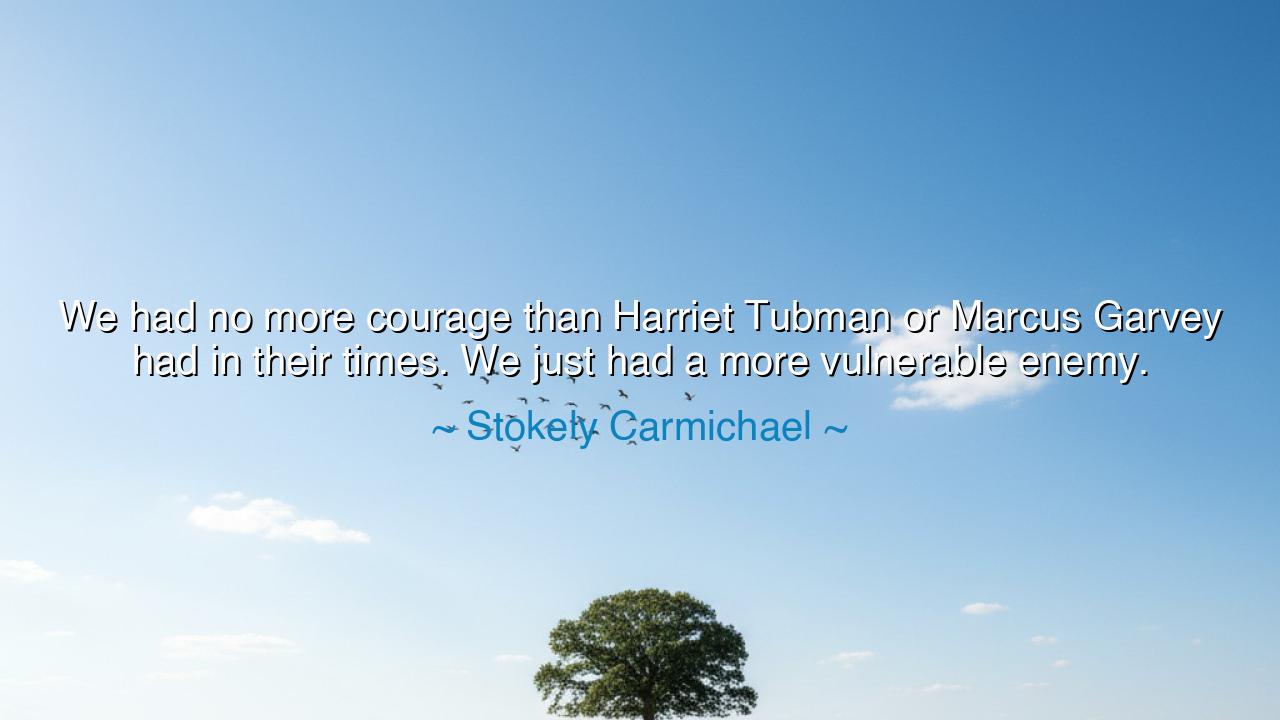
We had no more courage than Harriet Tubman or Marcus Garvey had
We had no more courage than Harriet Tubman or Marcus Garvey had in their times. We just had a more vulnerable enemy.






The revolutionary Stokely Carmichael, later known as Kwame Ture, once declared: “We had no more courage than Harriet Tubman or Marcus Garvey had in their times. We just had a more vulnerable enemy.” In this statement burns the fierce humility of a man who understood the lineage of struggle—the sacred chain that binds generations of fighters for freedom. Carmichael’s words remind us that every act of resistance is built upon the courage of those who came before, and that history’s heroes are not to be worshipped from afar, but to be continued through our own deeds. He denies personal glory to affirm a greater truth: that courage is not unique to an era or an individual—it is the eternal inheritance of the oppressed.
The meaning of his words unfolds like a layered flame. When Carmichael speaks of Harriet Tubman and Marcus Garvey, he invokes two mighty spirits of liberation—one who freed bodies from chains, the other who sought to free minds from servitude. He places himself and his peers—those of the Civil Rights and Black Power movements—alongside these icons not to elevate himself, but to level the ground of courage. He understood that each generation faces its own tyrant, and that courage is not measured by outcome, but by willingness. His humility conceals a profound respect: the struggles of Tubman and Garvey were no lesser, no easier, no less sacred. The difference, he says, lay not in the hearts of the fighters, but in the strength of the enemy they confronted.
When Carmichael speaks of a “more vulnerable enemy,” he means that by the 1960s, the United States—though still steeped in racial injustice—was exposed before the eyes of the world. The moral hypocrisy of a nation proclaiming liberty while denying it to millions had become harder to hide. Cameras captured brutality; international opinion shifted; old systems cracked under the weight of their own contradictions. Tubman had faced an enemy fortified by law and whip, Garvey an empire draped in colonial arrogance. Carmichael’s generation faced an empire wounded by its conscience—a beast still dangerous, yet bleeding through its own lies. Thus, the enemy was vulnerable, but not vanquished.
History gives flesh to Carmichael’s insight. Harriet Tubman, a woman born enslaved, risked death again and again to guide others to freedom through the Underground Railroad. She carried no weapon but faith, no power but conviction. She faced an enemy with absolute control over her life, yet she defied it with divine resolve. Marcus Garvey, in turn, dreamed of uniting the scattered sons and daughters of Africa under one proud banner. He faced mockery, imprisonment, and exile, yet his vision seeded movements that would outlive him. Compared to such giants, Carmichael humbly admits that his courage was not greater—but that his time afforded him a sliver more possibility, a crack in the fortress of oppression through which hope could slip.
Yet, Carmichael’s words carry also a warning. If one generation faces a “vulnerable enemy,” the next may face an enemy more cunning—one that disguises its oppression in comfort, its domination in distraction. He reminds us that courage must not sleep, for injustice wears many masks. Today, the struggle continues not only against overt tyranny, but against apathy, against systems that enslave minds while pretending to liberate them. To face such foes requires the same courage as Tubman’s, Garvey’s, and Carmichael’s—a courage grounded in truth, discipline, and vision.
The lesson here is eternal: do not imagine courage as the property of heroes, nor as a relic of history. It lives wherever human beings stand firm in the face of wrong. The flame that burned in Tubman’s heart, that blazed in Garvey’s voice, that thundered in Carmichael’s call for power—it is the same flame that lies within every soul that refuses submission. Courage is not the absence of fear; it is the refusal to bow before it. And though the enemy may change its face through time, the duty of courage remains unchanged.
So, to those who hear these words across generations: know that you are heirs to a sacred struggle. You need not be a hero in name, only steadfast in purpose. The world will always need those who stand, who speak, who act with conviction. As Stokely Carmichael teaches, it is not the might of the enemy, but the will of the courageous, that determines the course of history. Therefore, take heart. For though the enemies of justice may rise anew, they will always be vulnerable before the light of a people united in courage and truth.






AAdministratorAdministrator
Welcome, honored guests. Please leave a comment, we will respond soon